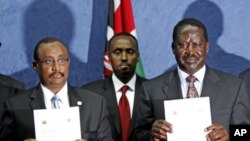More than two weeks after Kenyan troops first crossed the border into Somalia in pursuit of al-Shabab militants, the leaders of the two nations are calling for backup. The prime ministers of Kenya and Somalia have signed a joint statement in Nairobi requesting international assistance to fight what they called a common enemy.
Kenyan Prime Minister Raila Odinga and his Somali counterpart, Abdiwelli Mohammed Ali, have vowed their countries will work together to defeat al-Shabab. They say, however, they need more help from the international community to get the job done.
Odinga said, “Al-Shabab is a common enemy to all of us, and we would like to see that this menace is completely put behind us. We need international support in doing this because we would like to see that normal life return back to the Republic of Somalia.”
In terms of support, a joint statement from the two leaders called for additional troops from the African Union peacekeeping mission AMISOM.
Currently, the force has about 9,500 troops based in and around Mogadishu, providing security in the capital for Somalia’s Transitional Federal Government, or TFG. Djibouti recently pledged to contribute another 3,000 or so troops to the mission.
The statement also called for “logistical and financial support” for a planned blockade of the Somali port city of Kismayo, a major al-Shabab stronghold and supply center.
Ali said liberating areas of southern Somalia is the first step to getting assistance to the people living there.
“And then after that, to deliver humanitarian services to the people who were denied relief aid by this terrorist organization and also, as the prime minister said, to deliver other basic services such as education, health, recovery, reconstruction and development, because they deserve it. They were denied this for the last 20 years,” said Ali.
Last week, Somali President Sheikh Sharif Sheikh Ahmed indicated that he did not welcome the ongoing Kenyan incursion into Somalia to fight al-Shabab. But Ali insisted Monday that there is “no discord” in his government about the military operation, and said the TFG has taken the leading role.
Odinga also dismissed suggestions that this operation had been planned months or years in advance.
“We have not gone into this as a tea party. We have gone into this because of necessity. This is the first time in our history that Kenyan forces have gone outside our borders. The purpose is really to secure our own country. The cost to our economy has been great and rising,” said Odinga.
The aid group Doctors Without Borders says at least five civilians were killed and more than 40 wounded during an airstrike Sunday in southern Somalia.
The head of mission for Somalia, Gautam Chatterjee, told VOA that most of those killed and wounded were children, some of whom were being treated for cholera and malnutrition at clinics in the region.
Kenyan officials have confirmed attacking an al-Shabab target Sunday, but denied responsibility for civilian deaths.
Kenya, Somalia Request International Help to Fight Al-Shabab
- By Gabe Joselow




